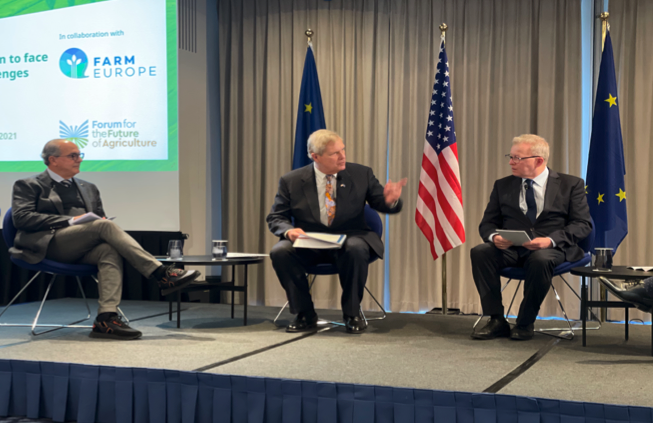On November 17, 2021, the European Commission published the EU Soil Strategy for 2030, a non-legislative document that addresses the issue of soil health. It is a document that outlines a framework and voluntary or legally binding actions that the Commission intends to undertake to protect, restore and sustainably use European soil. The strategy concretely translates some of the objectives of the European Green Deal and integrates with a series of strategies and policies already decided by the European Commission: from Farm to Fork to the Zero Pollution Action Plan, from the Biodiversity Strategy to the new CAP.
The Strategy is preparatory to a legislative proposal on soil health that the Commission will table by 2023 which will enable the objectives of this strategy to be met and good soil health to be achieved across the EU by 2050, together with the upcoming Commission proposal for a Nature Restoration Law aims at restoring ecosystems to good condition by 2050.
Given the lack of EU soil policy so far, the Communication has the ambition to address this gap and proposes an overall strategy on all aspects of a healthy soil having an impact on climate change, biodiversity, circular economy, food security and water protection and all policies to be adopted to overcome its degradation.
Of all the actions the Commission is committed to taking, the most significant are:
- proposing legally binding objectives in the context of the Nature Restoration Law, to limit drainage of wetlands and organic soils and to restore managed and drained peatlands, in order to maintain and increase soil carbon stocks, minimise flooding and drought risks, and enhance biodiversity ;
- present the EU carbon farming initiative and a legislative proposal on carbon removal certification in 2022 to promote a new green business model rewarding land managers, such as farmers and foresters, for climate–friendly practices ;
- as part of the Soil Health Law, assess the need for legally binding provisions for a ‘passport for excavated soil’ and consider options for proposing legally binding provisions to: a) identify contaminated sites, b) set up an inventory and register of those sites and c) remediate the sites that pose a significant risk to human health and the environment by 2050 ;
- assess the feasibility of the introduction of a soil health certificate for land transaction to provide land buyers with information on the key characteristics and health of the soils in the site they intend to purchase ;
- provide a definition of net land take in the Soil Health Law and consider options for monitoring and reporting on progress towards the no net land take targets ;
- prepare, in consultation with Member States and stakeholders, a set of ‘sustainable soil management’ practices, including regenerative farming in line with agro- ecological principles, adapted to the wide variability of soil ecosystems and types, and identify unsustainable soil management practices ;
- provide assistance to Member States to put in place through national funds the ‘TEST YOUR SOIL FOR FREE’ ;
- continue support to key initiatives such as the Great Green Wall initiative, Regreening Africa, and aid on land/soil issues in development cooperation to prevent desertification;
- revise the Directive on the Sustainable Use of Pesticides and evaluate the Sewage Sludge Directive by 2022 ;
- restrict intentionally used micro-plastics under the Registration, Evaluation, Authorisation and Restriction of Chemicals (REACH) Regulation and develop measures on the unintentional release of microplastics by 2022 ;
- adopt biodegradability criteria for certain polymers, such as coating agents and agricultural mulch films under the EU Fertilising Products Regulation by July 2024.
Moreover, the Commission will show its global leading role in building knowledge on soil biodiversity by publishing by 2022 the first assessment of EU soil biodiversity and antimicrobial resistance genes in agricultural soils under different management regimes (through the LUCAS (Land Use and Coverage Area frame Survey) ).
In the context of the CAP and in close cooperation with the Member States, Commission will continue the dissemination of successful sustainable soil and nutrient management solutions, including through the national rural networks of the rural development programme, farm advisory services and AKIS, and the European Innovation Partnership for Agricultural Productivity and Sustainability (EIP-AGRI).
The initiatives that make up this Soil Strategy are themselves at very different stages of maturation:
– the preparation of the revision of the directive on the sustainable use of pesticides is well underway,
– in contrast, the issue of plastics in soils is at the research stage with Horizon 2020 projects selected for launch in mid-2021, where the fundamental work has only just begun and will last four years,
– regarding the Carbon farming initiative, which should be the subject of a communication from the Commission next week, it seems that the Commission is more concerned with developing their methodology and collecting data. On grasslands, the most advanced point, the question of the capacity of soils to increase their storage or the fact that a ceiling is reached at some point is not clear. The methodology for estimating soil storage, for assessing the impact of changes in production techniques, for evaluating the contribution of those who are already better off, seem to be works in progress on which it seems important that we invest.
– finally, the commission endorses the objective of accelerating the deployment of the Great Green Wall in Africa with a shared objective of progress to be made on this file during the first half of 2022
